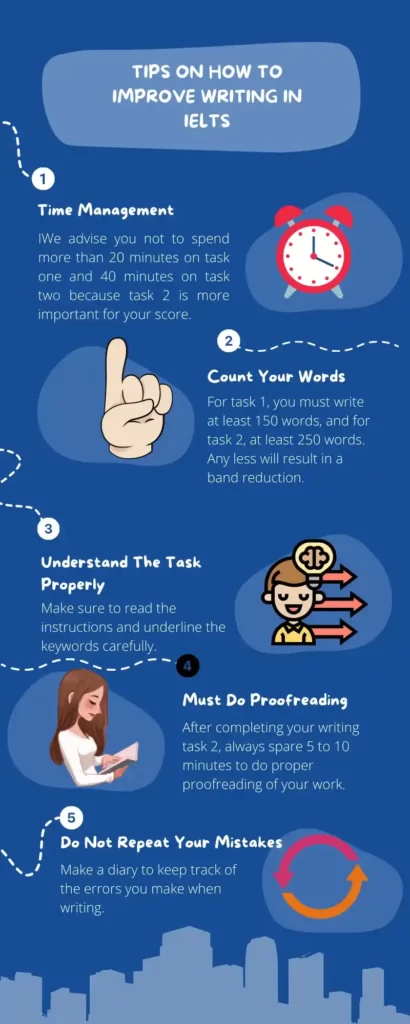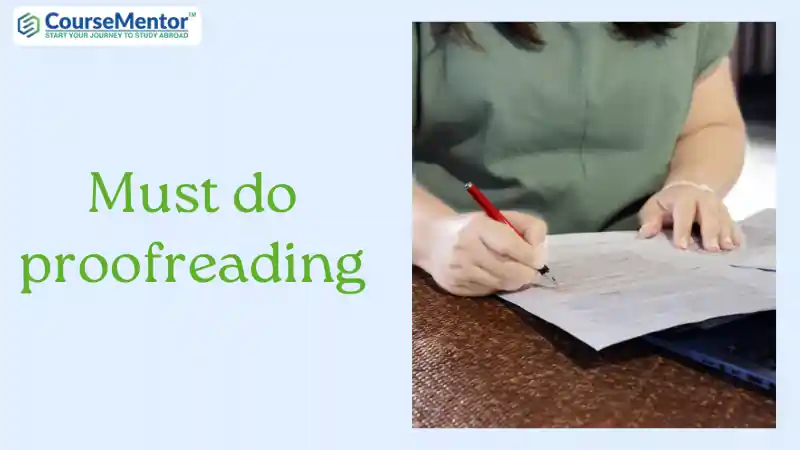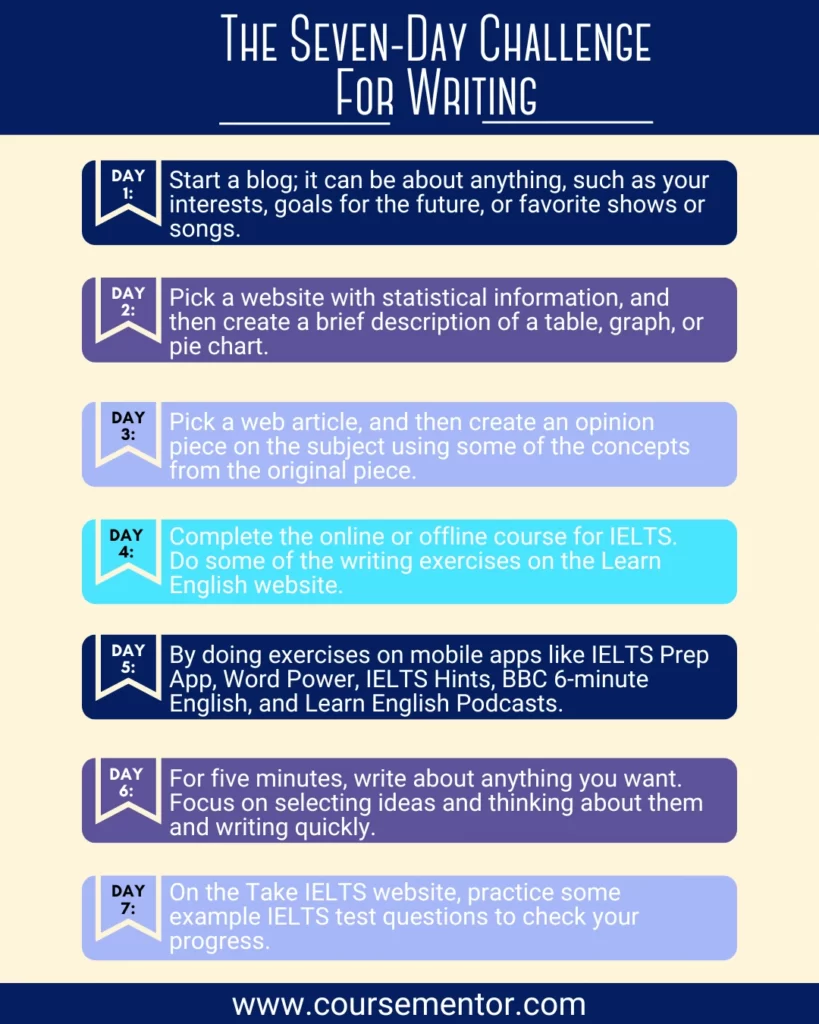Writing is the most important and one of the most difficult modules of the IELTS exam. Every student must think once in his or her life, “How to improve writing in IELTS?”
Writing is the module where you have to broaden your thinking. You have to be creative to get a higher band score in writing. To increase your writing skills, you should start thinking out of the box.
You can improve your writing only if you know what writing actually is. So, before you know tips to improve IELTS writing, you should know what IELTS writing is.
What is IELTS Writing?
The IELTS writing test checks your ability to respond to any topic in an accurate manner. It also checks how unique your ideas are and how you organize them in your writing to make them more attractive.
In this test, your grammar and vocabulary are checked. Lexical resources ( vocabulary ) and grammar are two main things that make your writing attractive and interesting to the reader.
How to improve writing in IELTS, to do this you need to apply some IELTS writing tips in your writing.
This module is divided into two tasks.
- Task 1
In this, you are required to write a summary of at least 150 words for visual data, most commonly in the form of a graph or chart. You must identify the key features and explain and compare them with the data given.
- Task 2
The second part of the writing test, IELTS Writing Task 2, requires you to write an essay responding to the point of view, an argument, or a problem. Your essay must be written in a formal tone and should be at least 250 words long. You are advised to finish your task 2 within 40 minutes.
Tips on How To Improve Writing In IELTS

- Time management
- Count your words
- Understand the task properly
- Organize your main ideas and supporting ideas in the proper way
- Know your approach (understand what you have to write )
- Must do proofreading
- Improve your grammatical range and lexical resources
- Do not repeat your mistakes
- Use The Last Paragraph For The Conclusion
- Give the Answer In Full Line
Time Management

It will take you 60 minutes to finish the writing section. We advise you not to spend more than 20 minutes on task one and 40 minutes on task two because task 2 is more important for your score.
Give yourself enough time to complete and proofread your work. Setting 60-minute time limits when taking practice tests is a smart habit to prepare for.
Count Your Words

For task 1, you must write at least 150 words, and for task 2, at least 250 words. Any less will result in a band reduction.
Understand The Task Properly

Make sure to read the instructions and underline the keywords carefully. You should know what details you must include and the questions you need to answer.
Organize Your Main Ideas And Supporting Ideas In The Proper Way

Spend up to five minutes thinking about ideas and deciding which details you have to add. Add linking words and punctuation between sentences and phrases, and arrange your ideas logically.
Know Your Approach (Understand What You Have To Write )

Task 1
Task 1 is different for both academic and general training IELTS.
IELTS Writing Task 1 Academic
For academic students, a graph, chart, or map is given, which provides details for you. You should write accurate information with accurate grammar and lexical resources.
You have to write at least 150 words in Task 1 of IELTS. You should cover all the striking points of the data given along with an overall and an introduction.
The more attractive your introduction and overall are, the higher your band score will be.
There are mainly seven types of IELTS writing topics in task 1. All the seven types of task 1 questions are listed below.
- Line Chart
- Table Chart
- Bar Graph
- Pie Chart
- Process
- Map
- Diagram
Task 1 for General Training
You must write a letter in task 1 for the general training IELTS exam. In task 1 for GT ( general training), you must write your letter in 150 words.
There is no introduction, and overall in your IELTS writing task 1 for GT ( general training), you need to write your letter. You need to answer according to the question asked by the examiner.
There are mainly three types of letters in IELTS general training task 1.
- formal letter
- semi-formal letter
- An informal letter or a personal letter
To understand how to improve writing in IELTS task 1, you need to know on which criteria your writing is measured.
For that, see the list below.
- Present accurate information
- Give an overview
- Must highlight key features or stages
- Give proper detail of data
IELTS Writing Task 2
The writing task is the same for both academic and general training. You will get a question in this section, and you have to answer that question with your own understanding of the topic.
To understand how to improve writing in IELTS task 2, you need to know on which criteria your writing is measured.
For that, see the list below.
- Answer the question properly
- Give relevant points and support ideas
- When asked for an opinion, give a clear opinion
- Give a conclusion
Must Do Proofreading

After completing your writing task 2, always spare 5 to 10 minutes to do proper proofreading of your work. This will help you catch silly mistakes and correct them.
Improve Your Grammatical Range And Lexical Resources

Spend time reading different materials before the test to learn new vocabulary for different situations, such as advertisements, articles, instructions, magazines, and reports. Practice forming sentences with new words and difficult sentence structures.
Do Not Repeat Your Mistakes

Make a diary to keep track of the errors you make when writing. Correct these errors and learn from them by working with friends who are also studying for the IELTS. By doing this, you can turn your weaknesses to your benefit.
Use The Last Paragraph For The Conclusion

At the end of your task, you have to write down the conclusion of your writing. In conclusion, you can write about what you have written in the paragraph. If, in the question, the examiner has asked you about your opinion or point of view, then, in conclusion, you must give that.
Give the Answer In Full Line

Do not use abbreviations in your writing, or do not use bullet points. You must write your answer in full lines or the proper way. The benefit of this will be that it will be easy for the examiner to understand what you want to say in your writing. The examiner can deduct your band score for writing the short or bullet points.
The Seven-Day Challenge For Writing

This seven-day challenge is the best answer to the question “how to improve writing in IELTS?”
Day 1
Start a blog; it can be about anything, such as your interests, goals for the future, or favorite shows or songs.
Day 2
Pick a website with statistical information, and then create a brief description of a table, graph, or pie chart.
Day 3
Pick a web article, and then create an opinion piece on the subject using some of the concepts from the original piece.
Day 4
Complete the online or offline course for IELTS. Do some of the writing exercises on the Learn English website.
Day 5
By doing exercises on mobile apps like IELTS Prep App, Word Power, IELTS Hints, BBC 6-minute English, and Learn English Podcasts.
Day 6
For five minutes, write about anything you want. Rather than focusing on accuracy, focus on selecting ideas and thinking about them and writing quickly.
Day 7
On the Take IELTS website, practice some example IELTS test questions to check your progress.
Conclusion (How To Improve Writing In IELTS)
In this post, we have discussed how to improve writing in IELTS. Along with tips, a seven-day challenge is also given, which will help you to increase your band score in writing.
The most important thing that will help you the most is your dedication to improving your writing. And how much you learn from your past mistakes is also important.
We hope you have enjoyed reading this post. For more interesting posts like this, keep visiting our website regularly.
How To Improve Writing In IELTS FAQs
How to improve grammar in IELTS writing?
While speaking in daily life, try to use correct grammer
Try to use passive voice while speaking
Do constant practice
Practice changing active voice to passive
Practice changing the tone according to the situation.
How to improve writing in IELTS general?
Use your time wisely.
Check the number of words.
Understand the task.
Organize your ideas logically.
Know your approach.
Think about style.
Check your work!
Work on your grammar
Use lexical resources
How can I improve my IELTS writing at home?
Look at some tips to ace your IELTS writing.
Understand the prompt.
Always make an outline.
Put your best foot forward.
Keep it simple.
Focus on language, not length.
Proofread!
How can I get an 8 in IELTS writing?
Look at some tips to ace your IELTS writing.
Understand the prompt.
Always make an outline.
Put your best foot forward.
Keep it simple.
Focus on language, not length.
Proofread!


